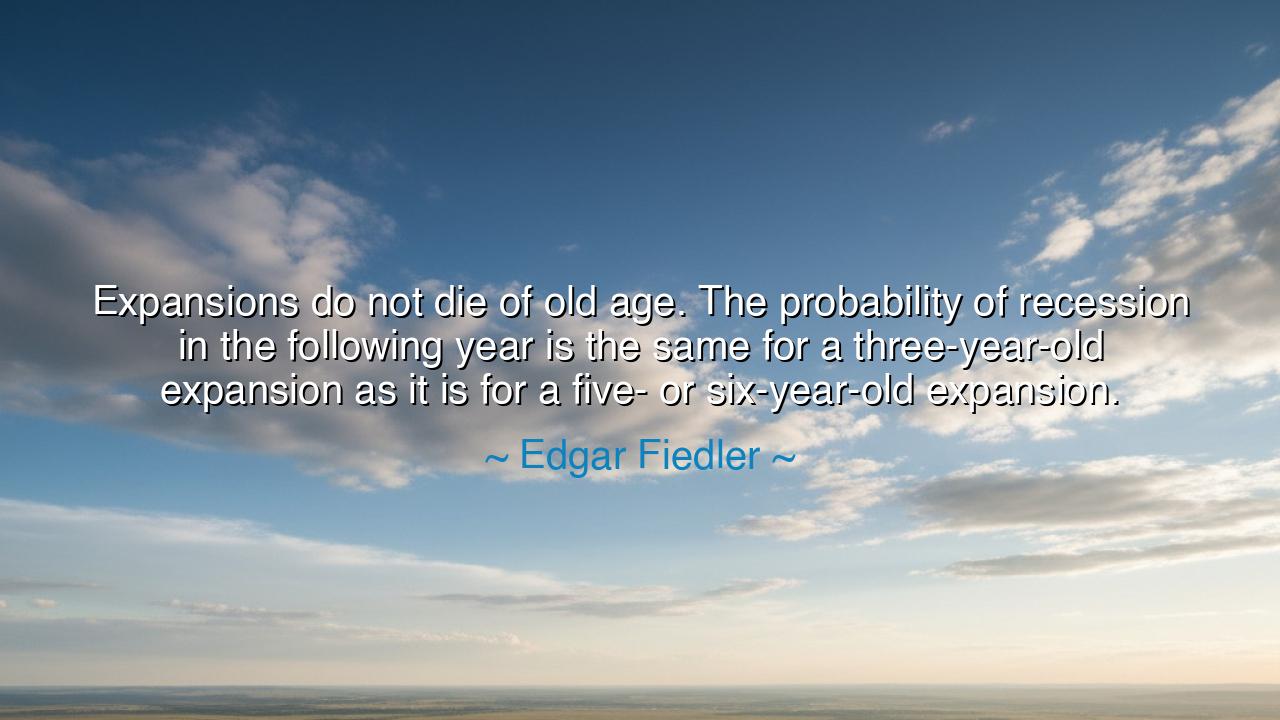
Expansions do not die of old age. The probability of recession in
Expansions do not die of old age. The probability of recession in the following year is the same for a three-year-old expansion as it is for a five- or six-year-old expansion.






"Expansions do not die of old age. The probability of recession in the following year is the same for a three-year-old expansion as it is for a five- or six-year-old expansion." — thus spoke Edgar Fiedler, the wise economist and counselor of policy, who sought to calm the restless hearts of men who feared the passing of prosperity. His words, though clothed in the language of markets and cycles, carry a truth far deeper than finance. For in them lies a lesson about growth, fear, and the fragile courage that sustains nations and individuals alike: that what we build does not wither simply because time has passed, but because we lose faith, discipline, or purpose.
In the ancient style, one might say: prosperity is not a fruit that rots with age, but a flame that dies when untended. Fiedler’s insight was born in the modern world of economics, yet its spirit is as old as the wisdom of kings. He taught that a nation’s economic expansion — the long season of growth and flourishing — does not collapse merely because it has endured for some years. There is no natural death awaiting it as the years advance. Rather, it is undone by folly, by excess, by fear itself. The recession, that dark winter of decline, comes not by fate but by the choices of men.
So too in the life of the soul and the fate of civilizations: success does not perish by age, but by neglect. Many believe that every golden age must fade, that every ascent must end in descent, as though time itself were an enemy. But this is a false surrender to fatalism. The cycle of prosperity endures so long as vigilance endures — as long as men work with prudence, correct their errors, and resist the temptations of arrogance. The sun sets only on those who cease to kindle its light.
Consider the story of Rome, that ancient empire which believed itself eternal. For centuries it expanded in power and splendor, and some feared that the sheer length of its prosperity foretold its fall. Yet Rome did not crumble because it had grown too old — it fell because it had grown too soft. The Romans ceased to labor as their ancestors did; they mistook comfort for peace, and conquest for strength. It was not time that destroyed Rome — it was decay of discipline and loss of virtue. The empire’s expansion, like an untended flame, was suffocated by its own indifference.
The same law governs the rise and fall of businesses, relationships, and dreams. When men say, “We have been fortunate for too long — misfortune must soon follow,” they prepare their own ruin. The expansion of the heart, the growth of purpose, does not age — it only weakens when doubt is allowed to reign. A thriving enterprise, a flourishing nation, even a joyful marriage — none of these decline simply because years have passed. They falter when their caretakers stop renewing them, when they believe that good fortune cannot endure without effort.
Fiedler’s words are therefore not merely economic but philosophical. They call upon us to resist the superstition of inevitability — that fatal whisper which tells us that every success must soon fall into failure. He reminds us that stability and prosperity are not gifts granted by time, but disciplines maintained by will. The wise do not count the years of their growth; they guard the principles that sustain it. The unwise, fearing an end that is not yet written, hasten it by their own timidity.
The lesson, then, is clear: do not fear longevity — fear complacency. Do not ask how long prosperity can last, but how steadfastly you can preserve it. Whether you speak of nations, of families, or of the human spirit, the same truth applies — growth does not die of old age; it dies when men forget the habits that brought it forth. When fortune smiles upon you, do not tremble at its passing; honor it by labor, gratitude, and foresight.
And so, my child, remember this: time itself is not your enemy. The passing years do not destroy what is sound — they only test its foundation. Recessions, in life or in spirit, come not from the calendar, but from carelessness. Therefore, live not in fear of decline, but in reverence for discipline. Tend your flame. Guard your virtue. Work with humility, and your expansion — whether of wealth, wisdom, or joy — may yet endure beyond the measure of any mortal age.






AAdministratorAdministrator
Welcome, honored guests. Please leave a comment, we will respond soon